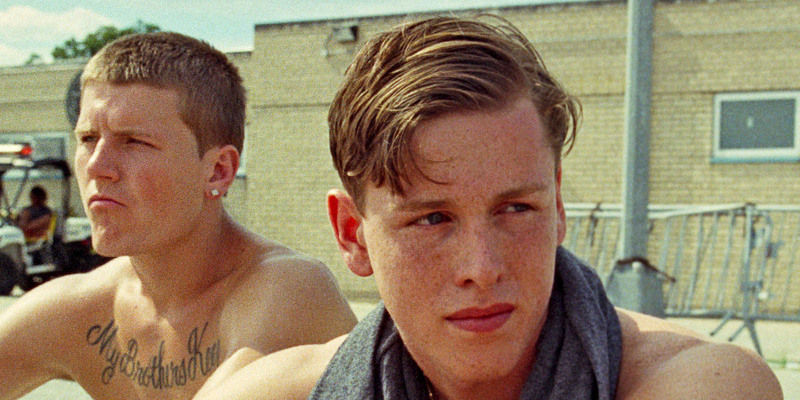
Review by
John Bennett
Directed by: Eliza Hittman
Starring: Harris Dickinson, Madeline Weinstein, Kate Hodge,
Neal Huff

In 1953, Ray Ashley, Ruth Orkin and Morris Engel released
Little Fugitive, a film made completely independently of Hollywood hegemony. The film
followed a young boy as he explored Coney Island after running away from
home, finely capturing the unique flavor of South Brooklyn. In representing
the special atmosphere of the southern tip of the New York borough as seen
through the eyes of a youth, Eliza Hittman gives us the 21st
century's correlative to Little Fugitive with
Beach Rats, her second feature after 2013's It Felt Like Love. With Beach Rats, Hittman manages to quietly weave themes of addiction, peer pressure,
poverty, family strife, locale and - most importantly - sexuality into one
deeply engaging indie film.

Beach Rats revolves around Frankie (played by
Harris Dickinson, who gives a striking performance in his feature
film debut), a teenager who leads an idle existence. On summer nights, he
hangs out with his ne'er-do-well friends as they drink, pick pockets, pop
pills, and scrounge for weed all over South Brooklyn, whose night sky is
often illuminated by the neon colours of beach fireworks or the flashing
lights of nightclubs. At home, Frankie’s father is slowly dying of cancer,
and the teen maintains somewhat contentious relationships with his tired
working mother (Kate Hodge) and his precocious younger sister (Nicole Flyus). When away from friends and family in the privacy of his room, Frankie
cruises adult chatrooms, slipping out of the house to have sexual encounters
with older men. In addition to these encounters, he also explores his
sexuality with Simone (Madeline Weinstein), a girl his age with whom
he seems to be testing the waters of a heterosexual romance.
Hittman, who both wrote and directed the film, adroitly crafts
Beach Rats as a film of tones and atmosphere, forgoing a
plot-driven structure that wouldn't have served the material nearly as well.
Frankie's father's illness is never over-explained. Instead, the viewer gets
one or two fleeting glimpses of the dying man, whose spectral presence
subtly underscores the family's general financial and health problems.
Similarly, Hittman presents Frankie's addiction to opioids in a naturalistic
way that eschews the potential dramatic histrionics of overdose or
withdrawal. The same goes for the petty criminal activities that Frankie and
his friends aimlessly commit. In one sequence that brings to mind the best
moments of Bresson's Pickpocket (1959), one friend quietly
steals a wallet from an unsuspecting man waiting in front of the friends in
line for a ride. They pass the wallet down the line to Frankie, who empties
it of all its cash, before they pass it back up the line and sneak it back
into the man's pocket. Again, there is no dramatic confrontation - just a
small moment that evokes the petty criminality that hangs around the friends
like a cloud of dust. These moments, all realistically suggestive rather
than expository, finely represent this unique milieu, whether under the
coloured lights of nightclubs and vape lounges, in the blazing summer sun,
or in the sad darkness of empty streets and rooms.

If Beach Rats is full of quiet moments, then it's the film's
sex scenes that constitute the brunt of the film's dramatic action. In its
depiction of a youth embarking on risky self-directed sexual adventures,
Beach Rats strongly resembles François Ozon's
Young & Beautiful (2013), in which a beautiful adolescent
(Marine Vacth) decides, for no apparent reason, to work as a prostitute.
Vacth and Dickinson bare a strong physical resemblance to one another, a
similarity that speaks to the androgynous magnetism both actors exhibit on
screen. Yet where Ozon is at times overly trenchant with his heroine's
sexual activity (even if Vacth plays the character with Deneuve-level
detachment), Hittmann steps back, allowing us to witness Frankie's sexual
experiences in a very factual way without forcing us to view these moments
through lenses of judgement, fetishisation, or any other kind of
meta-commentary. As a result, these sequences, whose graphic contents
objectively create a certain amount of unease in the viewer, slowly and
naturally build to an ending that's both tragic and ambiguous; Frankie's
unsure attempts to communicate the complex facets of his sexuality to both
his friends and a date leads inexorably to a moment of violence. Yet even
during this climactic moment, Hittman manages to keep a distance as she
succinctly merges her film's themes into one simple moment of confused
anguish for the film's hero. Through her objective sense of distance,
Hittman allows Frankie's sexuality to become the catalyst for a quiet, human
tragedy.
In general, Hittman thoughtfully blends the work of her collaborators.
Dickinson's probing gazes suggest a rich and confused interiority that gives
Beach Rats much of its narrative drive.
Nicholas Leone's unobtrusive score has a similar sad lilt as Jean
Constantin's music for Truffaut’s The 400 Blows (1959).
Cinematographer Hélène Louvart expertly teases out the neon colours
of beach fireworks and boardwalk amusements, while also showing as a visual
counterpoint just how dark cities and beaches can be at night as the titular
beach rats nefariously and listlessly wander between dunes and in and out of
small, old city houses.

If Beach Rats is flawed, it's flawed in a good way: it feels
slightly incomplete. Frankie is such a compelling character in the middle of
such a compelling urban environment that we're left wanting more by the time
the credits roll. But this is a good problem for a film to have; it speaks
to the sad, dangerous fascination that Beach Rats is
consistently able to generate.

Beach Rats is on MUBI UK now.
